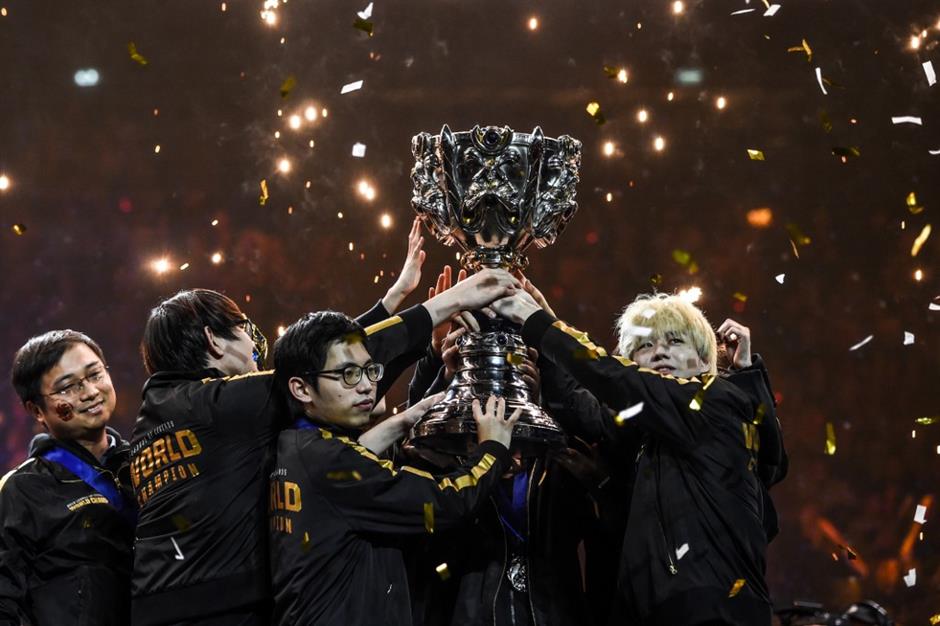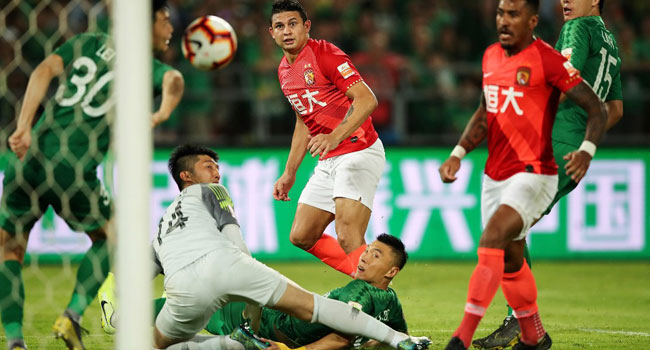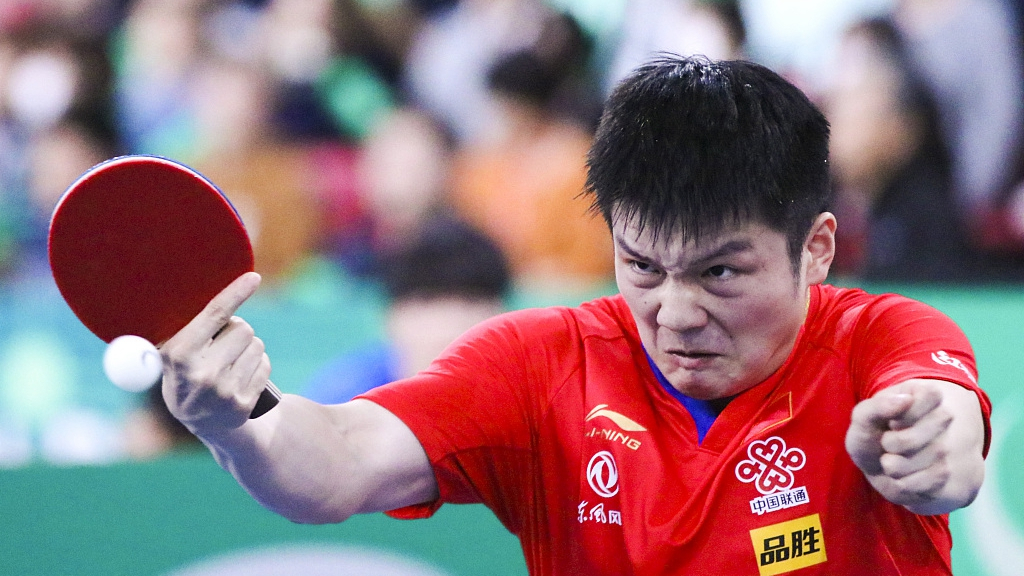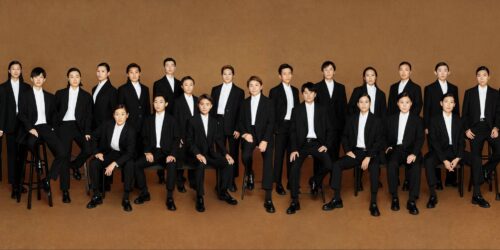Chinese team wins League of Legends World Championship final

The China Sports Column is a The China Project weekly feature.
A Chinese team, FunPlus Phoenix (FPX), are the newest world champs in League of Legends, the world’s most popular esport. The team, based in Beijing, defeated the European side G2 Esports in front of 15,000 spectators in AccorHotels Arena on Sunday in Paris.
The grand final, watched by a further 3.7 million streaming the action around the world (figures excluding China), saw an intriguing matchup between the current Chinese national champions against a European side hoping to be the first from outside Asia to win the grand prize and $835,000 purse.
But FPX crushed its European counterparts 3-0. The win may be seen by some as solidifying the shift in power from South Korea to China. The first five winners of this tournament were from Korea, but last year’s winner, Invictus Gaming, was owned by Wáng Sīcōng 王思聪, son of Wanda founder Wáng Jiànlín 王健林, and this year’s champs are owned by Beijing-based video game developers FunPlus.
Indeed, League of Legends in China is an example of a sporting success that doesn’t involve massive state investment. In a system dominated by the Chinese Olympic Association and other governmental bodies, it’s refreshing to see the growth of a sport in a country driven mainly by players and fans.
Yet as the exposure of League of Legends continues to grow in the country, the challenges facing developer Riot Games and players in China will continue to mount. Issues over censorship by parent company Tencent in an online space known for being hostile to regulation and very much pro-free speech will continue if Riot Games follow the path set by other Tencent-owned publishers.
Blizzard (also part-owned by Tencent), discovered this to its detriment, as the U.S.-based company took the extraordinary decision to punish a Hearthstone player, Blitzchung, for making comments supporting the Hong Kong protests. Blizzard received backlash from across the industry as fans, players and even Blizzard’s own employees condemned the cynical decision.
At the recently concluded BlizzCon fan convention, Blizzard president J. Allen Brack apologized for the way that was handled.
The intersection between the competition, the business, and Chinese and non-Chinese consumers and fans in the coming year will be fascinating to watch.
Chinese soccer denies rumors about the introduction of 50 naturalized players
The issue of naturalized players in the Chinese Super League (CSL) has reared its head again. The Chinese Football Association (CFA) recently denied rumors that it would be adding 50 naturalized foreign players in the CSL. Reports Xinhua:
“CFA will execute a very careful policy to introduce a strictly limited number of naturalized players,” added the Chinese football governing body, whose president Chen Xuyuan said a total of nine naturalized players have been registered at the CFA in August.
The CFA did admit, however, that it could change registration rules for foreign players in the upcoming season. They are due to publish the changes at the end of the year, and until then, everything remains speculation.
The controversial policy started with Norwegian-born John Hou Saeter, a.k.a., Hóu Yǒngyǒng 侯永永, in January 2019 as clubs began to sign players with Chinese heritage in an attempt to skirt the CSL’s foreign player limits (three allowed per match). The introduction of Brazilian Elkeson — now Ai Kesen — in August was the first time that a player without Chinese heritage had been selected for the national team. The policy has been supported by those governing Chinese soccer as pressure to qualify for the World Cup continues to mount.
The practice will almost certainly continue, as it has been 17 years since the men’s previous appearance at the World Cup. And things recently got worse: Following a 2-1 loss to Syria away in Dubai on Thursday, Marcello Lippi resigned as manager. “My pay is very high, and I take all the blame,” Lippi was quoted as saying. “I am quitting as China coach.” Since taking over the national team in May, Lippi oversaw a number of lackluster performances, such as a 0-0 draw against international minnows the Philippines on October 15.
The policy of naturalizing players has received a mixed response from clubs and fans alike. While the big clubs, such as Guangzhou Evergrande and Beijing Guo’an, are happy for the practice to continue, smaller clubs with more limited budgets are worried that they will begin to lose out as many lack the resources to offer financial packages to convince players to move to China and “give up” their passports.
Meanwhile, fans are still deciding whether qualifying for the World Cup with non-Chinese players is a price worth paying. It certainly helps when those players are doing well, as Ai Kesen has been, despite the poor service from his supporting players in midfield.
China dominates Ping Pong Team World Cup
In the least surprising news of the week, China had a clean sweep of both gold medals in the International Table Tennis Federation Team World Cup in Tokyo. The format of the tournament pits teams (men and women) from 17 nations of five players against each other as players compete in doubles and singles in the best of five matches in each tie. Unsurprisingly, China dominated the tournament.
The Chinese men’s team only lost a single match during the whole tournament and that was in the final against South Korea as China claimed gold in the tie with an overall score of 3-1, while the women won every single match as they cruised to the gold.
Last season saw Chinese fears grow around the potential rise in Japanese ping pong after 15-year-old Tomokazu Harimoto won the end of year tour finals as well as a strong Japanese showing in the Team World Cup last year. This season, however, has seen the Chinese team return to dominant ways, with Chinese players winning every major title this year. Indeed, young Tomokazu Harimoto was dispatched by men’s world No. 1 Fán Zhèndōng 樊振东 11-7, 11-4, 13-11, during their match in the men’s semifinal, as China defeated Japan 3-0 in the tie.
The worries look to have been put firmly to rest this season as the Chinese players head into the singles 2019 World Cup, held in Chengdu, and the end of year tour finals in Zhengzhou in imperious form.
The China Sports Column runs every week on The China Project.







